- About Ramapo
- Academics
- Admissions & Aid
- Student Life
- Athletics
- Alumni
- Arts & Community
- Quick Links
- Apply
- Visit
- Give
Teaching about the Experiences of Children Focus of Gumpert Teachers’ Workshop
(PDF) (DOC) (JPG)November 17, 2012
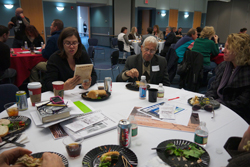
Gumpert Teachers’ Workshop
(MAHWAH, NJ) – On November 17, 2012, the Gross Center for Holocaust and Genocide Studies in cooperation with the New Jersey State Commission on Holocaust Education and with funding from the Gumpert Foundation and the New Jersey State Department of Education sponsored a Gumpert Teachers’ Workshop, “In Their Own Words: Diaries as a Window into the World of Children in the Holocaust.” Held at Ramapo College, it was attended by 42 educators from New Jersey and New York.
As noted in Center Director Michael Riff’s welcoming remarks, the workshop was intended to help teachers raise with their students issues relating to the treatment and behavior of children in the Holocaust and other genocides.
Speaking on behalf of the New Jersey Commission on Holocaust Education, Executive Director Dr. Paul Winkler took the matter further by indicating how discussing the experiences of children and teenagers in the Holocaust could help educators to confront issues beyond genocide, including bullying and human rights with their students.
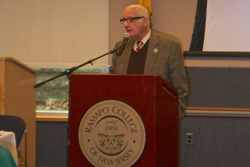
Dr. Paul Winkler
Author and scholar Alexandra Zapruder delivered an interactive keynote lecture to introduce the topic in which she discussed with workshop participants how to use the diaries from her edited volume Salvaged Pages: Young Writers’ Diaries of the Holocaust. In particular, she stressed how well students relate to the writing of people their own age. They are better able not only to learn and write about the Holocaust, but also to cope more effectively with adolescent behavior issues, stress and traumatic experiences in their own lives.
Published by Oxford University Press in 2005, Salvaged Pages was based on the work she did as a member of the curatorial and education team forRemember The Children: Daniel’s Story, the U.S. Holocaust Memorial Museum’s exhibition for young visitors.Highly acclaimed by reviewers and scholars alike, it won the National Jewish Book Award in the Holocaust category. Salvaged Pages also spawned a documentary film for young audiences, I’m Still Here, which Zapruder wrote and co-produced for MTV. The film was awarded the Jewish Image Award for Best Television Special by the National Foundation for Jewish Culture and was nominated for two Emmy awards.
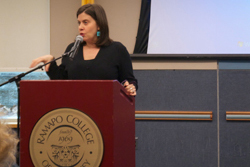
Alexandra Zapruder
Also presenting at the workshop was Colleen Tambuscio, who shared her experiences when she took students last year on a study tour of sites in Europe associated with the Holocaust. A Social Studies and Special Education teacher at New Milford High School, she stressed the transformative nature of the trips on student understanding of the Holocaust as well as involvement and engagement. She referred specifically to her students’ visit last year to the Czech Republic town of TÅTsice and their participation in a dedication to a memorial to honor villagers who during WW II courageously hid a Jewish family from deportation by Nazi occupiers.
Culminating the program was a panel discussion among three local residents who survived the Holocaust in hiding. Lola Kaufman, now of New City, New York, recounted how when the Gestapo killed her mother, she was sent by her grandmother to live in the home of a Ukrainian woman and, then, when threatened with exposure, she was forced to hide with another family in a dirt hole beneath a barn. Liberated by the Red Army, she finally found an uncle who survived as a Soviet soldier and with whom she eventually came to America.
At the end, the only thing that she had left from her ordeal was a dress embroidered by her mother and now in the permanent collection of the United States Holocaust Memorial Museum.
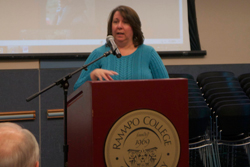
Colleen Tambuscio
A different story of survival was told by Suffern, New York resident and retired filmmaker Paul Galan, who trekked with his mother to the relative safety in a partisan redoubt in the mountains of Slovakia, but not before they were imprisoned in a labor camp and experienced several near brushes with German units combing the countryside for Jews and resistors. Miraculously, although separated along the way, after the liberation Paul and his mother were reunited with his father and sister.
No less an ordeal was faced by Eric Mayer of Wayne, New Jersey who in the aftermath ofKristallnacht (November 9/10, 1938) was first sent by his parents to stay with relatives in France, but then was forced to flee south where he eventually, although still in his early teens, joined a partisan group that interdicted a SS division heading to engage allied troops landing in Normandy. Like Mrs. Kaufman and Mr. Galan, the experience of war and hiding from the Germans forced Mayer to grow up quickly. Once the son of a prosperous wine grower and merchant in Worms, Germany at the end of the war he was an orphan, with his father dying in the Sobibor uprising. With the help of relatives, Mr. Mayer and his brother were eventually able to re-settle in Baltimore, Maryland.
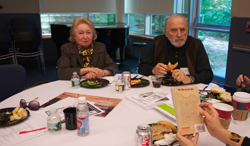
Lola Kaufman and Paul Galan
As has been the case for some time, evaluations completed by participants revealed that the workshop was a great success. They found all the presentations to be informative and helpful in enabling to develop their skills in teaching of the Holocaust and expressed special gratitude for being able to hear first-hand from survivors about their experiences.
E-News Archives
| 2023 | 2022 | 2021 | 2019 | 2018 | 2017 | 2016 | 2015 | 2014 | 2013 | 2012 | 2011 | 2010 | 2009 | 2008 | 2007 |Copyright ©2024 Ramapo College Of New Jersey. Statements And Policies. Contact Webmaster.

Follow Us!